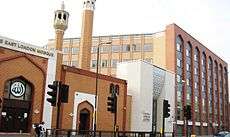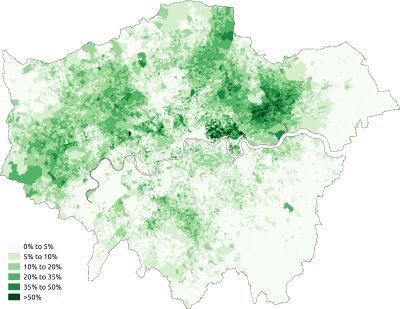Islam in London

Islam is London's largest minority religion. There were 607,083 Muslims reported in the 2001 census in the Greater London area.[1] In the 2011 census Office for National Statistics, the proportion of Muslims in London had risen to 12.4% of the population (40% of England's Muslims). In the boroughs of Newham and Tower Hamlets, the percentages of Muslims were over 30%.
History

The first Muslims to settle in London were lascars, that is, Bengali and Yemeni sailors from the 19th century. Many Muslims from the Commonwealth served in the British Army and British Indian Army in the First and Second World Wars. In the wave of immigration that followed the Second World War, many Muslims emigrated to the UK from these Commonwealth countries and former colonies. Following the partition of India, many came from Pakistan especially the Punjab and Azad Kashmir and the Indian state of Gujarat. This initial wave of immigration of the 1950s and 60s was followed by migrants from Cyprus, Sylhet Bangladesh, formerly East Pakistan. Many Muslims also arrived from various other countries, although the percentage is far smaller than from South Asia. Amongst those from other countries, Muslims from Yemen, Somalia and Turkey have significant numbers, whereas those from Malaysia, Nigeria, Ghana and Kenya represent smaller fractions. Today, London's Muslims come from all over the world and there is a small but growing group of converts.
21st century
Most of London's Muslims are descendants of immigrants from the South Asia, particularly Pakistan, Bangladesh, Afghanistan and India. There is also a large number of Muslims from Arab countries. Among African Muslims there are large Maghreb (including Algerian and Egyptian) communities and Somali communities, as well as the equally large 200,000 members of the West African Muslim community. In addition, London is home to large Turkish and Bosnian Muslim communities, both of which comprise over 30,000 members. The city also has a high number of restaurants that serve halal food (around 2,300).
However, this influx of immigrants has led to community relations issues. In the East End of London, there is a lot of tension in the area around East Ham, Barking and Dagenham between Muslims and non-Muslims. The British National Party gained their highest vote by proportion, 16.9%, in the 2005 General Election in Barking[2] and has 12 councillors on Barking & Dagenham Borough Council.[3]
Notable mosques and other institutions
The first purpose-built mosque in London is in Southfields, Wandsworth. The Fazl Mosque was inaugurated in 1926 as a project of the Ahmadiyya community of Qadian, India. Since 1984, the mosque and its surrounding buildings have been the residence of the Khalifatul Masih caliphs and therefore, the international headquarters of the Community.
One of the first large mosques was on Brick Lane, in a listed building which started life as a church in the 18th century and was converted into a synagogue in the 19th, reflecting the changing waves of immigration, from Huguenots to Eastern European Jews to Bengalis. Soon after the Brick Lane Mosque opened, two large mosques were built, the East London Mosque (with the adjoining London Muslim Centre and Maryam Centre) on Whitechapel Road not far from Spitalfields, and the London Central Mosque in Regent's Park.
Other mosques in Inner London include the Brixton Mosque, in the midst of an Afro-Caribbean area, and the Finsbury Park Mosque (also known as the North London Central Mosque).
The Suleymaniye Mosque on Kingsland Road serves a largely Turkish community. Named after the famous landmark in Istanbul, it was purpose-built and opened in 1999. Shacklewell Lane Mosque was the first Turkish mosque in the United Kingdom.[4] It was established by Turlish Cypriots in 1977, also in a converted synagogue.[5][6] The nearby Aziziye Mosque in Stoke Newington was converted from a cinema.
In Outer London are the Croydon Mosque, the very large Baitul Futuh Mosque in Merton, and the Abbey Mills Mosque in Stratford. Also notable are the Central Mosque Wembley, Leytonstone Mosque, and Harrow Central Mosque.
The Islamic Centre of England is an educational establishment that opened in 1998. London is also home to The Islamic College, a college and university which offers A-levels, BA, and MA degrees in coordination with Middlesex University.
Ethnic background

London Muslim population origin
(UK: 500,000)[10][11]
(includes people from Cyprus and Turkey)
- Pakistani - 240,000
(UK: more than 1,000,000)
- Bangladeshi - 170,000
(UK: around 500,000)
- Somali - 140,000
(UK: 200,000-250,000)
- Iraqi - 130,000
(UK: 240,000)
- Nigerian - 120,000
(UK: 220,000)
- Indian - 100,000
(UK: 330,000 that are Muslims and 1,300,000 non-muslims)
- Afghan - 71,000
(UK: 100,000-150,000)
- Ghanaian - 70,000
(UK: 100,000)
Most spoken languages
as first language
- Turkish language - 230,000 (Turkish and Turkish Cypriot community)[12]
- Punjabi language/Pothwari language - 180,000 (Pakistani community)
- Urdu language/Hindi language - 33,000 (Indian and Pakistani community)
- Gujarati language - 75,000 (Indian and Pakistani community)
- Bengali language/Sylheti language - 161,000 (Bangladeshi and Indian community)
- Malayalam language - 12,000 (Indian community)
- Tamil language - 35,000 (Sri Lankan and Indian community)
- Arabic language - 145,000 (Arab communities)
- Somali language - 140,000 (Somali community)
- Amharic language - 52,000 (Ethiopian and Eritrean community)
- Kurdish language - 42,000 (Kurdish community)
- Hausa language - 70,000 (Nigerian and Ghanaian communities)
- Pashtu language - 55,000 (Pakistani and Afghan community)
- Sindhi language - 25,000 (Pakistani and Indian community)
as second language
- Urdu language/Hindi language - 133,000 (Pakistani and Indian community)
- Arabic language - 455,000 (Pakistani, Somali, Indian, Bangladeshi and other communities)
- Persian language - 58.000
Boroughs
Local municipalities with large Muslim constituencies include:
- Tower Hamlets - 110,200
- Bangladeshis, Somalis, Nigerians, Ghanaians, Pakistanis, Indians
- Newham - 86,900
- Pakistanis, Algerians, Kurds, Nigerians, Afghans, Albanians, Ghanaians, Swahilis, Arabs, Bangladeshis, Indians, Somalis, Iraqis"
- Brent - 64,600
- Somalis, Nigerians, Ghanaians, Algerians, Moroccans, Afghans, Indians, Pakistanis, Lebanese, Bangladeshis
- Ealing - 54,000
- Pakistanis, Somalis, Indians, Afghans, Nigerians,Saudis
- Waltham Forest - 49,700
- Pakistanis, Somalis, Swahilis, Algerians, Bangladeshis, Indians"
- Hounslow - 45,400
- Pakistanis, Somalis, Indians, Afghans, Iraqis
- Hackney - 39,000
- Nigerians, Ghanaians, Somalis, Bangladeshis
- Croydon - 37,800
- Somalis, Pakistanis, Nigerians, Ghanaians, Indians
- Enfield - 37 388
- Turkish and Turkish Cypriots, Somalis, Kurds, Albanians, Nigerians, Bangladeshis
- Haringey - 34,100
- Indians, Turks, Pakistanis, Iraqis, Ghanaians
- Lambeth - 30,300
- Jamaicans, Nigerians, Ghanaians, Somalis, Algerians, Moroccans, Bangladeshis, Indians, Pakistanis, Iraqis, Afghans
- Redbridge - 28,000
- Pakistanis, Indians, Somalis, Nigerians, Ghanaians, Iraqis
- Southwark - 27,100
- Bangladeshis, Iraqis
- Lewisham - 25,200
- Nigerians, Ghanaians, Bangladeshis
- Wandsworth - 22,600
- Pakistanis, Somalis, Indians
- Barnet - 18,200
- Indians; Turks, Ghanaians, Iraqis
See also
- List of British Muslims
- Londonistan (term)
- Islam Expo
- Islam in Birmingham
- Islam in England
- Islam in the United Kingdom
- Islamism in London
- Wembley’s Conference of Living Religions 1924
- Religion in England
- Religion in London
References
- ↑ Area: London - Religion (UV15) (Office for National Statistics) accessed 2 March 2009
- ↑ Milmo, Cahal (2006-04-20). "How the BNP is gaining ground in Barking with a campaign of lies and distortions". The Independent. London. Retrieved 2010-05-05.
- ↑ Your councillors
- ↑ Geaves, Ron (2001), "The Haqqani Naqshbandi: A Study of Apocalyptic Millennnialism within Islam", in Porter, Stanley E.; Hayes, Michael A.; Tombs, David (eds), Faith in the Millennium, Sheffield Academic Press, ISBN 1-84127-092-X.
- ↑ Çoştu, Yakup (2004), "Londra'da Türklere Ait Dini Organizasyonlar" (PDF), Hitit Üniversitesi İlahiyat Fakültesi Dergisi, Hitit University, 8 (16): 77–100
- ↑ Weinreb, Ben; Hibbert, Christopher; Keay, Julia; Keay, John (2010), The London Encyclopedia, Macmillan, ISBN 1-4050-4925-1
- ↑ The Guardian. "A guide to ethnic communities". London. Retrieved 2009-01-18.
- ↑ Kelami Dedezade. "Teaching Bilingual Science" (PDF). Retrieved 2010-03-27.
- ↑ Yilmaz, Ihsan (2005). Muslim laws, politics and society in modern nation states: dynamic legal pluralisms in England, Turkey, and Pakistan. p. 6. ISBN 0-7546-4389-1.
- ↑ Federation of Turkish Associations UK. "BRIEF HISTORY OF THE FEDERATION OF TURKISH ASSOCIATIONS IN UK". Retrieved 2010-03-27.
- ↑ Ingiltere Atatürkçü Düşünce Derneği. "İngiltere Atatürkçü Düşünce Derneği'nin tarihçesi, kuruluş nedenleri, amaçları". Retrieved 2010-12-12.
- ↑ BBC Voices Multilingual Nation. "Turkish today by Viv Edwards". Retrieved 2008-10-29.
External links
- Reassessing what we collect website – Muslim London History of Muslim London with objects and images
- Subject Guide on Islam in London